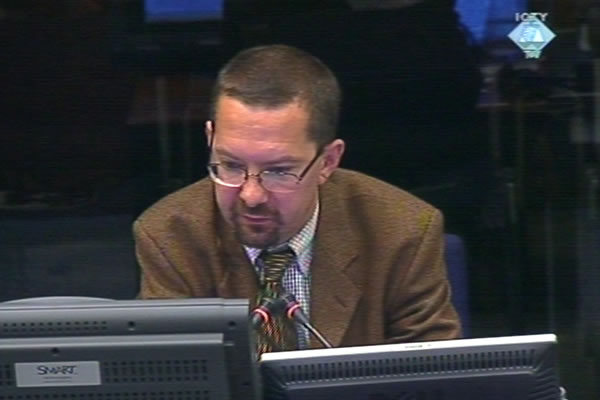Home
POLICE “COMBED THEIR HAIR” AS THE VILLAGE BURNED
In his cross-examination of the prosecution expert, Radovan Karadzic claimed it took time for those who were prone to crime to show their tendencies, using a folk saying to corroborate his argument, ‘Snow doesn’t fall to cover the hills but so that each beast may show their tracks’. The witness replied in passable Serbian with another saying which, as he said, describes the conduct of the Bosnian Serb police, ‘The old woman combs her hair as the village burns’
 Christian Nielsen, witness at the Radovan Karadzic trial
Christian Nielsen, witness at the Radovan Karadzic trial In his cross-examination of prosecution expert Christian Nielsen, Radovan Karadzic noted that the Republika Srpska police was ‘helpless’ and under attack by the paramilitaries. These developments forced Karadzic to ask Milan Panic, the then FRY prime minister, for help in dealing with the problem. He noted that in July 1992, the Federal Sup dispatched a group of special police to Republika Srpska to help the RS MUP arrest the paramilitaries.
Karadzic also recalled that in the summer of 1992 he and Prime Minister Panic made a joint appeal to the Muslim refugees to return to their homes. Nielsen did not contest these claims, but said it ‘caused discontent among the presidents of the crisis staffs in the municipalities where refugees were to return’. The witness did not want to comment on Karadzic’s statement that ‘there is the best time for the return of the refugees’ since he was not an expert for refugee issues.
Karadzic also noted that among the Serbs there was always ‘a lot of mutual mud-slinging and intrigues based on personal interests and hatred’. According to him, in World War II, the Serbs were divided into Chetniks and partisans, monarchists and those who wanted a pro-Soviet revolution’. This was ‘a kind of a curse’ he tried to reverse by reconciling Chetniks and partisans. ‘I am a result of the reconciliation’, Karadzic said, noting his father came from a ‘royalist’ family, while his mother was from a communist family.
The witness agreed that Radovan Karadzic, Milorad Ekmecic, Dobrica Cosic and many others who elaborated the ideology of the Serbian Democratic Party (SDS) wrote that the Serbian people was split into Chetniks and partisans, calling it a tragedy. ‘From the SDS standpoint, it is clear that the goal was to reach an historic reconciliation, but I would like to note that many Serbs in BH, Serbia, Montenegro and Croatia claimed that the SDS was closer to the Chetnik than to the partisan tradition,’ the witness said, adding that his claim was supported by a number of documents in which the RS MUP describes the SDS as the main player in the effort to liberate the Serbian people.
When Karadzic asked him if he agreed that ‘false patriots’ committed crimes in the name of the Serb people, the witness noted that the presence of paramilitary units was tolerated between April and July 1992. In late July, the attitude of the RS MUP towards such groups changed; the police now treated them differently, the witness said, ‘not only because the groups were involved in criminal activities, but because there were cases in which Serbs were the victims’.
The witness dismissed Karadzic’s claim that ‘it was impossible to tell who was prone to crime until they exhibited criminal behavior’; Nielsen used Veljko Milankovic as an example. The man had a thick police file from before the war and everyone knew that. The police let him and his ilk do whatever they liked, as long as they acted like ‘patriots’. According to Karadzic, trafficking and smuggling that Milankovic was charged with were not considered a crime, but as ‘defrauding the state’ in a country which had ‘long been under the Ottoman rule’ and was ‘often under foreign rule’.
Karadzic used a folk saying to corroborate his argument that time tells who is prone to crime, ‘Snow doesn’t fall to cover the hills, but so that each beast may show their tracks’. The witness laughed and responded in Serbian, with another folk saying which, according to him, best describes the conduct of the Bosnian Serb police, ‘The old woman combs her hair while the village’s on fire’.
Linked Reports
- Case : Karadzic
- 2011-07-12 SERB MUP ‘WAS ILLEGAL IN THE POSITIVE SENSE’
- 2011-07-07 THE ‘BIRTH’ OF SERB POLICE AND ITS FIRST RESULTS
- 2011-07-06 PROSECUTION EXPERT ON THE SPLIT IN BH MUP
- 2011-07-14 ‘MADNESS’ IN BRCKO
- 2011-07-15 MIROSLAV TUDJMAN MUST MEET WITH KARADZIC’S DEFENSE
- 2011-07-15 INVESTIGATIONS OF CRIMES LEFT FOR ‘BETTER TIMES’
